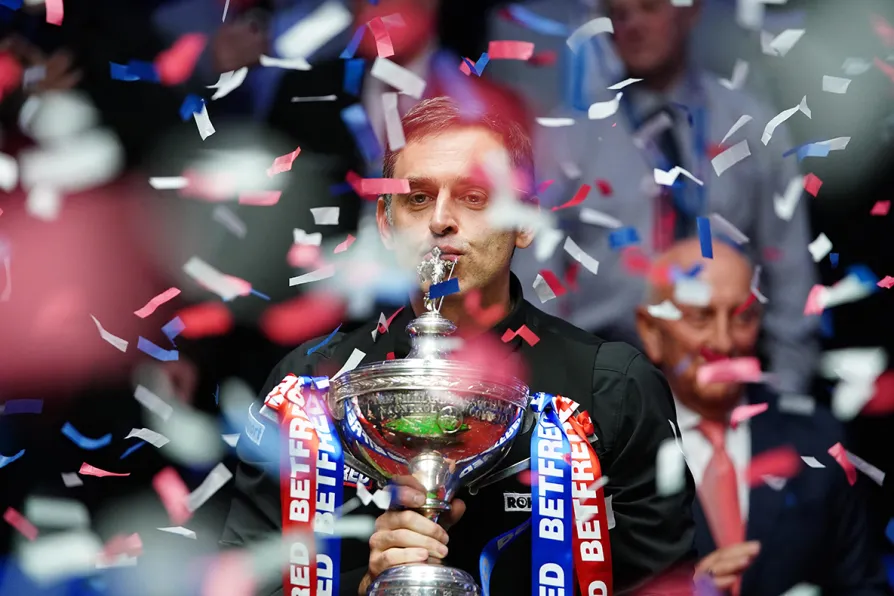
 Ronnie O'Sullivan celebrates with the trophy during day seventeen of the World Snooker Championship at The Crucible, Sheffield
Ronnie O'Sullivan celebrates with the trophy during day seventeen of the World Snooker Championship at The Crucible, Sheffield
RONNIE O’SULLIVAN lifted the World Snooker Championship trophy for the seventh time last week, matching Stephen Hendry’s tally for the modern era.
This led to a flood of plaudits for the 46-year-old from within the game and beyond, and discussions about his greatness not only in snooker but in the overall sporting landscape.
O’Sullivan himself brushed this off in typical fashion, commenting on the BBC: “It is just a number. I do not get too caught up in that.
“Hendry is an absolute legend of the game,” he added, but O’Sullivan, in both his achievements and the way he plays the game, is undoubtedly a legend of the game in his own right, and the greatest the sport has seen.
The young O’Sullivan would whizz around the table with the speed of players like Tony Drago or Alex Higgins, but with the pot success of someone like Hendry and the break-building knowledge of Willie Thorne.
His quickness earned him the nickname “The Rocket.” This was most evident when he famously made the fastest-ever 147 break, taking just five minutes and eight seconds for his maximum in the first round of the 1997 World Championship.
And that flair remains to this day, especially when a frame is won and the shackles are off. The break-building is rapid but accurate, and the cue ball control second to none.
His opponent in this year’s final, the 32-year-old Judd Trump, takes inspiration from O’Sullivan, especially when it comes to the entertainment factor.
Trump’s combination of inventiveness and cue power sees him play shots other players might not even think of, and the end of his breaks can turn into snooker exhibitions.
He and O’Sullivan shared a long embrace at the end of last Monday’s final. An emotional O’Sullivan went straight to his opponent rather than celebrating the win at the table, revealing afterwards that he was moved by Trump’s words during this exchange.
“I was emotional because of the drain and the effort, to finally get over the line, I just thought it would never happen,” O’Sullivan said on Eurosport.
“I just gave him [Trump] a big hug and was just sobbing in his arms. And he said such lovely words.
“What he said to me blew me away, to be honest. It just blew me away. I love Judd, he’s a good lad.
“And I didn’t realise what he thought of me until then — different respect there. I didn’t realise how he sees me and how I’ve been part of his development.”
The post-match embrace was as much Trump comforting O’Sullivan as the other way around, and the now seven-time champion was also emotional as he sat alongside his friend and inspiration Jimmy White in the Eurosport studio.
Over on the BBC’s coverage of the final, Steve Davis, the six-time world champion who paved the way for players like Hendry and O’Sullivan, admitted that one of the reasons O’Sullivan is the best ever is because the field is stronger now than it was during his own reign.
O’Sullivan turned professional in the same year as two of the game’s other greats, John Higgins and Mark Williams. Between the three of them, known as the Class of ‘92, they have 14 World Championships, half of which belong to O’Sullivan.
Davis dominated the game in the 1980s before Hendry did so in the 1990s. Hendry, who described the Crucible as like his home venue, also praised O’Sullivan after the Englishman matched his seven World Championships.
“He’s taken snooker to new heights,” Hendry said on the BBC.
"He’s a winning machine. He said he doesn’t look at the records but he’ll want to get eight.
“The way he’s dominated this World Championship from start to finish, it’s been an outstanding performance.
“OK, he’s maybe not been put under pressure, but that’s because he’s played so well and has refused to let people put him under pressure.
“He’s just been wonderful. You can't give him enough compliments for the way he’s played here.”
Hendry hints at one difference between himself and O’Sullivan being that O’Sullivan has not dominated an era in terms of consecutive world titles.
Davis won all six of his World Championships in a nine-year period while Hendry won his seven within just 10 years.
There is a 21-year gap between O’Sullivan’s first world title and his latest, but rather than being a negative, this longevity is the reason his greatness transcends snooker.

Zhao becoes China's first world snooker champion













